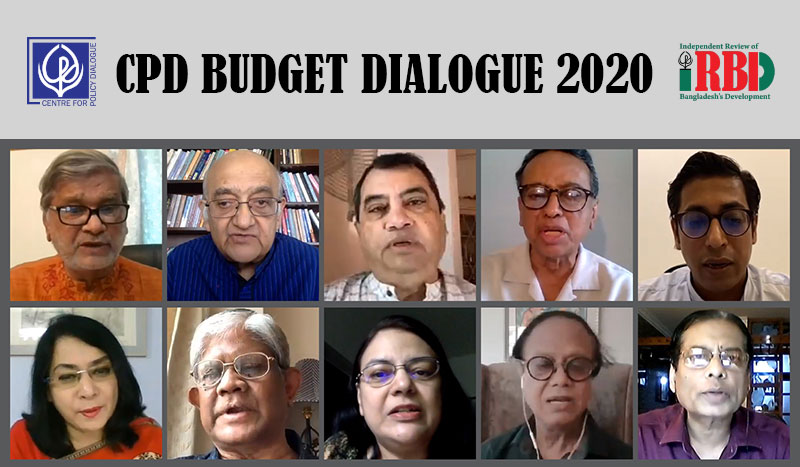
Fiscal measures outlined in the proposed budget for FY 2020-21 are incoherent in view of the ground realities. The budget has been outlined with unrealistic targets, inadequate allocations in priority sectors such as health. It also overlooks the increasing discrimination in society.
The budget may require a revisiting of its allocations and priorities considering the COVID-19 challenges. The government needs to focus on saving and improving citizens’ lives and livelihoods rather than focusing on GDP-centric growth. The government may create a taskforce to improve accountability in budget implementation, especially for COVID related activities.
These views were shared at the CPD Budget Dialogue 2020 on 20 June 2020. The event was organised under CPD’s flagship programme Independent Review of Bangladesh’s development (IRBD).
Professor Mustafizur Rahman, Distinguished Fellow, CPD made the keynote presentation on behalf of CPD. He mentioned that CPD’s analysis of the budget FY2021 has been prepared to assess the coherence of fiscal measures, assumptions and credibility of the macroeconomic forecast, soundness of fiscal framework, and priorities of budgetary allocations. He mentioned that the actual revenue growth target may reach 49.5%, that is, approx. an additional amount approximately Tk. 125,000 crore may need to be mobilised. The proposed budget targets to meet up the deficit by borrowing Tk 87,000 crore from banks. This may create a liquidity problem and discourage the banks to lend money to other borrowers, he said.
Mr M A Mannan, MP, Hon’ble Minister for Planning, GoB, present as the Chief Guest at the dialogue, said that the government is observing the crisis very carefully and making necessary interventions where necessary. It is true that there are some limitations in implementing the government’s decisions, but we can work together to overcome the challenges.
Mr Saber Hossain Chowdhury, MP, Honorary President, Inter-Parliamentary Union (IPU) and Chairman, Parliamentary Standing Committee on Ministry of Environment, Forest and Climate Change, spoke as a Guest of Honour at the event. He said that it is not the time to run after GDP growth. China did not declare their GDP growth this year, rather they are working on improving the employment scenario in their country. We should also look into improving and saving the lives of our citizens. We need to come out from the traditional fiscal framework and should really put focus on improving the quality of public services.
Mr Nahim Razzaq, MP, Member, Parliamentary Standing Committee on Ministry of Foreign Affairs, as Guest of Honour, observed that there is lack of accountability in implementing budgetary allocations, particularly for the COVID-19 related activities. He suggested improving accountability mechanisms in budget implementation through a participatory process where the citizens can take part in the process.
Mr Amir Khosru Mahmud Chowdhury, Former Minister for Commerce, as Guests of Honour, mentioned that the government may have overlooked the realities and needs of the citizens while formulating the budget. The health sector has been suffering from corruption, lack of technological improvements, and inadequate human resources. The government has ignored the financial sector as well. There is no rule of law and now the government has provided the opportunity for whitening the black money. This is a reward for corruption in the country, he said.
Dr Salehuddin Ahmed, Former Governor, Bangladesh Bank, said that we need to re-organise the priorities for FY2021 and strategically revise the budget accordingly in view of the emerging challenges from the COVID-19 pandemic.
Dr Ahsan Habib Mansur, Executive Director, Policy Research Institute of Bangladesh and Chairman, BRAC Bank, spoke as a Discussant at the event. He said that the government could announce the budget periodically- one for July to December 2020 and the later one for the period from January to June 2021. It would have been a more strategic way to assess the present situation and design the solutions accordingly. The government must strengthen social safety net programmes and ensure effective implementation so that the affected citizens are being supported adequately.
Barrister Nihad Kabir, President, Metropolitan Chamber of Commerce and Industry (MCCI), as a Discussant, said that it is a must to improve the capacity of the National Revenue Board (NBR) if the government plans to increase revenue mobilisation. The business community of this country is willing to provide adequate support to the government but at the same time the government also needs to address the required reforms in the NBR.
Dr Sayema H Bidisha, Professor, Department of Economics, University of Dhaka; Ms Ferdaus Ara Begum, Chief Executive Officer, Business Initiative Leading Development (BUILD); Dr Maleka Banu, General Secretary, Bangladesh Mahila Parishad; Mr Jalal Ahmed, Former Additional Secretary, Ministry of Finance; Mr Kamran T Rahman, President, Bangladesh Employers’ Federation (BEF); Mr Nazmul Ahsan, Manager – A4I Project, ActionAid Bangladesh; Mr K M Enamul Hoque, Deputy Director, CAMPE; Dr Lelin Choudhury, Chairman, Health and Hope, Health and Hope Hospital; and Mr Syed Almas Kabir, President, Bangladesh Association of Software & Information Services (BASIS) shared their views at the event as Special Commentators.
Professor Rehman Sobhan, Chairman, CPD, as the Chair of the event, said that the government should effectively monitor the implementation of the budget, especially the incentive and relief packages. The civil society, private sector, and media can play a critical role here to improve accountability in the implementation process. The government should particularly focus on increasing the coverage and efficacy of social safety net programmes to support the affected citizens, said Professor Sobhan.
Dr Fahmida Khatun, Executive Director, CPD, moderated the session. She said that the proposed budget is not based on realistic assumptions and priority sectors have not received adequate allocation. The government still has time to revisit the priorities in view of the unprecedented challenges of COVID which are having a serious impact on the economy.
The event was participated by experts, economists, researchers, development activists, academics, journalists among others.

